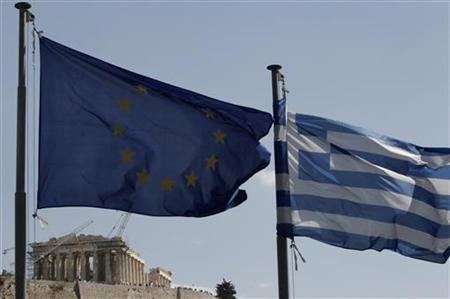EU and IMF Give Greece €6.8bn Bankruptcy Lifeline [VIDEO]

Eurozone leaders and the International Monetary Fund will drip feed Greece billions of euros in aid to save it from bankruptcy - but have stopped short of granting the full €8.1bn due under the terms of its bailout plan.
Instead, the Troika - the European Union, IMF and European Central Bank (ECB) - will channel €6.8bn (£5.9bn, $8.8bn) into the sovereign debt-riddled country, so it can repay €2.2bn of bonds in August this year.
However Eurozone chiefs say that Greece has to keep its promises on cutting public sector jobs and other reforms in order to get the entire tranche of €8.1bn.
Eurozone finance ministers also agreed to share the burden of saving Greece from default by staggering payments.
Athens will initially receive a €2.5bn installment from all Eurozone countries in July, and then a further €500m in October.
Eurozone central banks will follow a similar payment plan, with a €1.5bn chunk in July and a further €500m in October.
The IMF will grant the remaining €1.8bn in August.
Fight for Survival
Greece is under pressure to prove it can deliver on the austerity measures demanded by lenders as conditions for its full chunk of bailout cash.
For example the country has agreed, as part of its rescue package terms, to cut 15,000 public sector jobs by the end of 2014.
Although the Greek government laid out plans to place 12,500 public sector workers into a so-called "mobility scheme," which is aimed at transfering or terminating their employment within a year, it has already missed the June deadline.
Greece is still struggling to axe jobs and shore up cash, and continues to deliberate on whether to implement a hugely unpopular property tax.
However, if Greece's lenders had refused to grant the next tranche of its €240bn rescue package, the country would default on its debt and send crippling economic repercussions across the rest of Europe.
Greece's unemployment remains the highest in Europe and the number of young people without a job is now soaring above 60%.
Greece used to have one of the lowest suicide rates in the EU but since 2010, the number of people taking their own lives has increased by 40%, with a large proportion from the older generation.
© Copyright IBTimes 2025. All rights reserved.






















